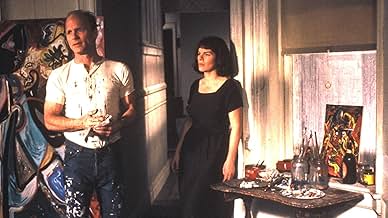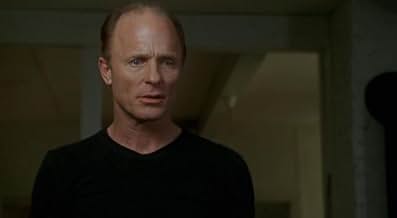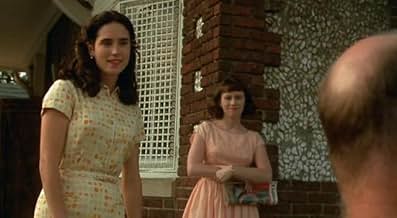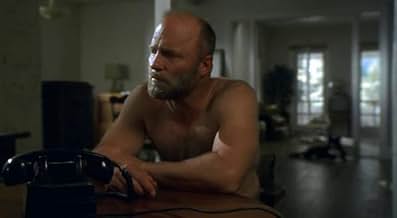IMDb-BEWERTUNG
7,0/10
30.480
IHRE BEWERTUNG
Ein Film über das Leben und Werk des amerikanischen Malers Jackson Pollock.Ein Film über das Leben und Werk des amerikanischen Malers Jackson Pollock.Ein Film über das Leben und Werk des amerikanischen Malers Jackson Pollock.
- 1 Oscar gewonnen
- 3 Gewinne & 10 Nominierungen insgesamt
Eulala Scheel
- Arloie's Baby
- (as Eulala Grace Harden)
Empfohlene Bewertungen
Pollock (2000)
There's no question this is a well made film, and based pretty much on truth, and an interesting truth--the life of a great Abstract Expressionist. Some would say the greatest of them all.
For myself, this isn't enough, and I know this is me. I'm an art critic and professor of Art in my real life, and I'm never very patient with movies about artists. The reason isn't that there are inaccuracies, but that there is a subtle or not-subtle goal of aggrandizing the subject. This reaches a beautiful but, again, romanticized, peak when Pollock makes his famous break into true gestural, raw work in a large commissioned piece for Peggy Guggenheim (who is portrayed, oddly, as a shy and dull sort, which I've never pictured). Then later he makes his drip works. And then he dies, again over dramatized and made aesthetic, as tragic and ugly as it had to have been in life.
If you want to really get into Pollock's head, especially if you aren't already a fan (I love Pollock's work), this is a convincing movie. At the helm as both director and playing the artist is Ed Harris. He is especially believable as a painter, which is something of an important point. This isn't like those movies about musicians where the actor is clearly not playing. Harris actually paints the darned thing, the big masterpiece, on the cusp of the drip works. I don't know if Harris was drinking, too, but he's a good drunk, and of course Pollock was a better drinker than a painter, even.
It's a cheap shot to say a movie could have been shorter, but this one sure would have propelled better with less atmosphere, less filler that is meant to create his life but is interesting only as an illustration of historical facts. It wore me thin for those reasons. Again, it might be a matter of how much you can get sucked into the given drama that is Jackson Pollock's life. It was quite a life, crude, untempered, brave, and immensely connected to what matters as an artist.
There's no question this is a well made film, and based pretty much on truth, and an interesting truth--the life of a great Abstract Expressionist. Some would say the greatest of them all.
For myself, this isn't enough, and I know this is me. I'm an art critic and professor of Art in my real life, and I'm never very patient with movies about artists. The reason isn't that there are inaccuracies, but that there is a subtle or not-subtle goal of aggrandizing the subject. This reaches a beautiful but, again, romanticized, peak when Pollock makes his famous break into true gestural, raw work in a large commissioned piece for Peggy Guggenheim (who is portrayed, oddly, as a shy and dull sort, which I've never pictured). Then later he makes his drip works. And then he dies, again over dramatized and made aesthetic, as tragic and ugly as it had to have been in life.
If you want to really get into Pollock's head, especially if you aren't already a fan (I love Pollock's work), this is a convincing movie. At the helm as both director and playing the artist is Ed Harris. He is especially believable as a painter, which is something of an important point. This isn't like those movies about musicians where the actor is clearly not playing. Harris actually paints the darned thing, the big masterpiece, on the cusp of the drip works. I don't know if Harris was drinking, too, but he's a good drunk, and of course Pollock was a better drinker than a painter, even.
It's a cheap shot to say a movie could have been shorter, but this one sure would have propelled better with less atmosphere, less filler that is meant to create his life but is interesting only as an illustration of historical facts. It wore me thin for those reasons. Again, it might be a matter of how much you can get sucked into the given drama that is Jackson Pollock's life. It was quite a life, crude, untempered, brave, and immensely connected to what matters as an artist.
10L8nDA
Ed Harris has taken the biopic to a new level. Although the skeleton of the film is no more than the troubled life of an alcoholic struggling with fame, the power of the acting and sequence of the film take it a step further. The relationship between Krasner and Pollock mirrors that of Stanley and Stella Kowalski but Krasner is a much stronger character and Marcia Gay Harden more than deserved the oscar she received for the part. The only part that concerned me was the explanation Harris chose to show Pollock's progression to his drip paintings. The arbitrariness of the "revelation" seems stretched to me and suggests that it is actually known how Pollock made that movement. All in all, the movie is excellent and worth seeing.
Just be careful - I cringed every time he got into a car...
Just be careful - I cringed every time he got into a car...
10jhclues
The romantic notion of suffering for one's art has been cinematically rendered in countless films, depicting the lives of real life artists ranging from Van Gogh to Camille Claudel to Beethoven to Jim Morrison to Rimbaud; but rarely has a film penetrated as deeply as `Pollock,' directed by and starring Ed Harris as the abstract painter Jackson Pollock. The story begins in 1941 and chronicles Pollock's life until the early 50s. It's a vivid, and at times grim portrait of a true artist struggling for recognition, as well as with the inner demons that plague his soul and are reflected in his art and the way he lives his life. It is said that the artist `sees' the world differently than the average person, which may be true; and it is that unique `vision' that sets the artist apart. And Pollock was no exception to the rule.
As romantic as it may sound, the reality of suffering for one's art is just that: Suffering. For realizing that vision and bringing it to fruition is more often than not an arduous and tortuous path to tread. Coalescing the fragments of that vision and transferring that information into reality can be a painful process, and one of the strengths of this film is that it so succinctly conveys that sense of desperation and frustration that are seemingly an intrinsic part of `creating.' There's a scene in which Pollock, after having been commissioned to do a mural, sits on the floor of his studio with his back against the wall staring for days on end at the blank canvas stretched across the room, waiting for that spark of inspiration, that sudden moment when what he must do will crystallize in his mind's eye. It's a powerful, intense scene that allows you to share that creative process with the artist and experience the emotional turmoil of it, as well as the exhilaration of the moment when it all suddenly becomes clear, when the vision is realized. It's a stunning moment; Pollock's face fills the screen and you actually see it in his eyes, the exact moment of discovery. And it's absolute magic.
As Pollock, Ed Harris gives arguably the best performance of his career; he perfectly captures every emotional level of this complex individual, from the manic highs and lows (exacerbated by alcohol consumption) to the neutral moments in between. He totally immerses himself in the character, and what surfaces is a thorough and memorable picture of a tortured genius and flawed human being. It's an astounding piece of work, for which he most certainly should have taken home the Oscar for Best Actor.
Marcia Gay Harden received the Academy Award for Best Supporting Actress for her portrayal of Lee Krasner, the woman who loved Pollock and devoted herself (even at the expense of her own career as an artist) to the man and his art. It's a terrific performance, through which Harden brings Lee to life, physically and emotionally. Her amount of screen time seemingly should have qualified her for a Best Actress nomination, but regardless, her work here is unquestionably deserving of the Oscar.
The supporting cast includes Amy Madigan (Peggy Guggenheim), Jennifer Connelly (Ruth), Jeffrey Tambor (Clement), Bud Cort (Howard), John Heard (Tony), Sada Thompson (Stella Pollock) and Val Kilmer (Willem de Kooning). Harris' triumph with `Pollock' does not begin and end with his extraordinary performance, however; though his acting is so exceptional it would be easy to overlook the brilliant job of directing he did with this film. And it is brilliant. The way this film is presented is the work of not only a seasoned professional, but of a professional artist with a unique vision of his own. One of the best films of the year (2000), hopefully it will in the future receive the acclaim of which it is so richly deserving. Hopefully, as well, Harris will direct again; for it is talent like his, and films like this one, that expand the Cinematic Universe as we know it. I rate this one 10/10.
As romantic as it may sound, the reality of suffering for one's art is just that: Suffering. For realizing that vision and bringing it to fruition is more often than not an arduous and tortuous path to tread. Coalescing the fragments of that vision and transferring that information into reality can be a painful process, and one of the strengths of this film is that it so succinctly conveys that sense of desperation and frustration that are seemingly an intrinsic part of `creating.' There's a scene in which Pollock, after having been commissioned to do a mural, sits on the floor of his studio with his back against the wall staring for days on end at the blank canvas stretched across the room, waiting for that spark of inspiration, that sudden moment when what he must do will crystallize in his mind's eye. It's a powerful, intense scene that allows you to share that creative process with the artist and experience the emotional turmoil of it, as well as the exhilaration of the moment when it all suddenly becomes clear, when the vision is realized. It's a stunning moment; Pollock's face fills the screen and you actually see it in his eyes, the exact moment of discovery. And it's absolute magic.
As Pollock, Ed Harris gives arguably the best performance of his career; he perfectly captures every emotional level of this complex individual, from the manic highs and lows (exacerbated by alcohol consumption) to the neutral moments in between. He totally immerses himself in the character, and what surfaces is a thorough and memorable picture of a tortured genius and flawed human being. It's an astounding piece of work, for which he most certainly should have taken home the Oscar for Best Actor.
Marcia Gay Harden received the Academy Award for Best Supporting Actress for her portrayal of Lee Krasner, the woman who loved Pollock and devoted herself (even at the expense of her own career as an artist) to the man and his art. It's a terrific performance, through which Harden brings Lee to life, physically and emotionally. Her amount of screen time seemingly should have qualified her for a Best Actress nomination, but regardless, her work here is unquestionably deserving of the Oscar.
The supporting cast includes Amy Madigan (Peggy Guggenheim), Jennifer Connelly (Ruth), Jeffrey Tambor (Clement), Bud Cort (Howard), John Heard (Tony), Sada Thompson (Stella Pollock) and Val Kilmer (Willem de Kooning). Harris' triumph with `Pollock' does not begin and end with his extraordinary performance, however; though his acting is so exceptional it would be easy to overlook the brilliant job of directing he did with this film. And it is brilliant. The way this film is presented is the work of not only a seasoned professional, but of a professional artist with a unique vision of his own. One of the best films of the year (2000), hopefully it will in the future receive the acclaim of which it is so richly deserving. Hopefully, as well, Harris will direct again; for it is talent like his, and films like this one, that expand the Cinematic Universe as we know it. I rate this one 10/10.
Films like "Pollock" always leave me at a loss when I have to describe them to others. For one thing, it's long been a labor of love for director / star Ed Harris, which maybe causes me to have more sympathy for the picture than I should -- after all, I'd hate to ream a project that he's spent so much time and energy developing. For another thing, I usually find biopics a bit crippled because, in most cases ("Pollock" included), I already know the plot, and without the plot to get lost in, I'm left to look at little things like, you know, the acting, writing and directing. Lucky for Harris (and my conscience), then, that the acting is uniformly great, the direction is mostly seamless (and downright kinetic at times), and the writing, while not being great in the "Casablanca" sense of the word, serves the story well. "Pollock" dodges all the pitfalls that often turn biopics into boring history lessons.
The film picks up with Jackson Pollock the Unsuccessful Drunk (Harris), dabbling in surrealist painting and proclaiming Picasso to be a fraud. There's enough promise in his work, though, for him to gain a girlfriend, Lee Krasner (Marcia Gay Harden); a benefactor, Peggy Guggenheim (Amy Madigan); and a professional critic, Clement Greenberg (Jeffrey Tambor), who champions his work in print. From there we watch Pollock take the express train to art world superstardom, becoming one of the world's foremost abstract painters.
The fly in the ointment, though, is Pollock's notorious temper, aided and abetted by his equally notorious alcoholism. Life in New York City is doing his personal life no favors, so he and Krasner move to the countryside, and it's here that he stumbles upon his "drip method" of painting, granting him another wave of fame and recognition. It is this sequence, in which Pollock makes his pivotal discovery, where Harris's talent as a director comes to the fore. Although we're aware that we're watching an actor perform a discovery that was made by someone else more than fifty years ago, it's an exciting, dynamic moment as Harris dances around his canvas, flicking paint from his brush in a blur of motion. It doesn't come off as staged or phony, but as a moment of genuine discovery, and for those moments we might as well actually be watching Jackson Pollock revolutionize the art world.
From there, though, ego, alcohol, and the mechanics of change all prove to be Pollock's undoing, leading, of course, to his untimely demise. Through it all, Harris seethes with a feral intensity, giving a performance that should rightfully win him an Oscar (and check out the dramatic weight gain at the end. Tom who?). Harden, his co-nominee, is also excellent (although she's stuck uttering lines like, "You've done it, Pollock. You've cracked it wide open."). In lesser hands, Krasner could be just another version of the screeching, wailing, put-upon wife, but Harden bolsters the anguish with a fine layer of anger; the torment of a woman who loves the person causing her misery, but who is unwilling to let go of the principles which led her to enter and maintain the relationship on her own terms.
"Pollock" ultimately succeeds because we know how it will end, we clearly see how unpleasant and deluded the artist had become, and still we can't look away. Harris's labor of love serves as an auspicious debut for someone who, at this stage, seems just as skilled behind the camera as he is in front of it.
The film picks up with Jackson Pollock the Unsuccessful Drunk (Harris), dabbling in surrealist painting and proclaiming Picasso to be a fraud. There's enough promise in his work, though, for him to gain a girlfriend, Lee Krasner (Marcia Gay Harden); a benefactor, Peggy Guggenheim (Amy Madigan); and a professional critic, Clement Greenberg (Jeffrey Tambor), who champions his work in print. From there we watch Pollock take the express train to art world superstardom, becoming one of the world's foremost abstract painters.
The fly in the ointment, though, is Pollock's notorious temper, aided and abetted by his equally notorious alcoholism. Life in New York City is doing his personal life no favors, so he and Krasner move to the countryside, and it's here that he stumbles upon his "drip method" of painting, granting him another wave of fame and recognition. It is this sequence, in which Pollock makes his pivotal discovery, where Harris's talent as a director comes to the fore. Although we're aware that we're watching an actor perform a discovery that was made by someone else more than fifty years ago, it's an exciting, dynamic moment as Harris dances around his canvas, flicking paint from his brush in a blur of motion. It doesn't come off as staged or phony, but as a moment of genuine discovery, and for those moments we might as well actually be watching Jackson Pollock revolutionize the art world.
From there, though, ego, alcohol, and the mechanics of change all prove to be Pollock's undoing, leading, of course, to his untimely demise. Through it all, Harris seethes with a feral intensity, giving a performance that should rightfully win him an Oscar (and check out the dramatic weight gain at the end. Tom who?). Harden, his co-nominee, is also excellent (although she's stuck uttering lines like, "You've done it, Pollock. You've cracked it wide open."). In lesser hands, Krasner could be just another version of the screeching, wailing, put-upon wife, but Harden bolsters the anguish with a fine layer of anger; the torment of a woman who loves the person causing her misery, but who is unwilling to let go of the principles which led her to enter and maintain the relationship on her own terms.
"Pollock" ultimately succeeds because we know how it will end, we clearly see how unpleasant and deluded the artist had become, and still we can't look away. Harris's labor of love serves as an auspicious debut for someone who, at this stage, seems just as skilled behind the camera as he is in front of it.
Jackson Pollock (Ed Harris) is famous with a Life magazine cover in 1950. The movie flashes back to 1941. He's a drunk staying in Greenwich Village with his brother and pregnant wife. Artist Lee Krasner (Marcia Gay Harden) shows some interest and becomes his lover/supporter. His brother moves to Connecticut. Jackson breaks down which is why he can't be drafted into the war. Lee takes Jackson home acting more and more like his manager. His work eventually gains the attention of art collector Peggy Guggenheim (Amy Madigan) who gives him an one-man show in 1943. Lee and Jackson decides to move to a country house on Long Island away from the drinking and doing more work. His paintings are still not selling and then the Life article happens. Lee and Jackson have a roller-coaster relationship and then he has an affair with Ruth Kligman (Jennifer Connelly).
Ed Harris directs a mostly straight forward biopic of Jackson Pollock with a few fascinating scenes of painting sessions. His directing style doesn't necessarily project Jackson mental breakdowns but his acting is able to bridge the gap. Ed Harris is not the most imaginative director visually but it is overcome by good actors doing good work. It is a good debut directorial effort.
Ed Harris directs a mostly straight forward biopic of Jackson Pollock with a few fascinating scenes of painting sessions. His directing style doesn't necessarily project Jackson mental breakdowns but his acting is able to bridge the gap. Ed Harris is not the most imaginative director visually but it is overcome by good actors doing good work. It is a good debut directorial effort.
Wusstest du schon
- WissenswertesEd Harris's father, Bob L. Harris, bought his son a book about Jackson Pollock simply because he felt Ed bore a strong resemblance to the painter. Ever since then, Ed Harris became fascinated with Pollock's life.
- PatzerWhen the photographer is making the movie of Pollock, he "zooms" in on the shoes. But the old 16 mm camera he is using has a turret with three fixed lenses; thus, he should not be able to zoom. All his other shots are as expected from fixed lenses of different focal lengths.
- Zitate
Jackson Pollock: If people would just look at the paintings, I don't think they would have any trouble enjoying them. It's like looking at a bed of flowers, you don't tear your hair out over what it means.
- SoundtracksThe Mighty Blues
Improvisation
Performed by The Port of Harlem Jazzmen
Courtesy of Blue Note Records
By Arrangement with EMI Capitol Music Special Markets
Top-Auswahl
Melde dich zum Bewerten an und greife auf die Watchlist für personalisierte Empfehlungen zu.
- How long is Pollock?Powered by Alexa
Details
Box Office
- Budget
- 6.000.000 $ (geschätzt)
- Bruttoertrag in den USA und Kanada
- 8.598.593 $
- Eröffnungswochenende in den USA und in Kanada
- 44.244 $
- 17. Dez. 2000
- Weltweiter Bruttoertrag
- 10.994.533 $
- Laufzeit2 Stunden 12 Minuten
- Farbe
- Sound-Mix
- Seitenverhältnis
- 1.85 : 1
Zu dieser Seite beitragen
Bearbeitung vorschlagen oder fehlenden Inhalt hinzufügen

































